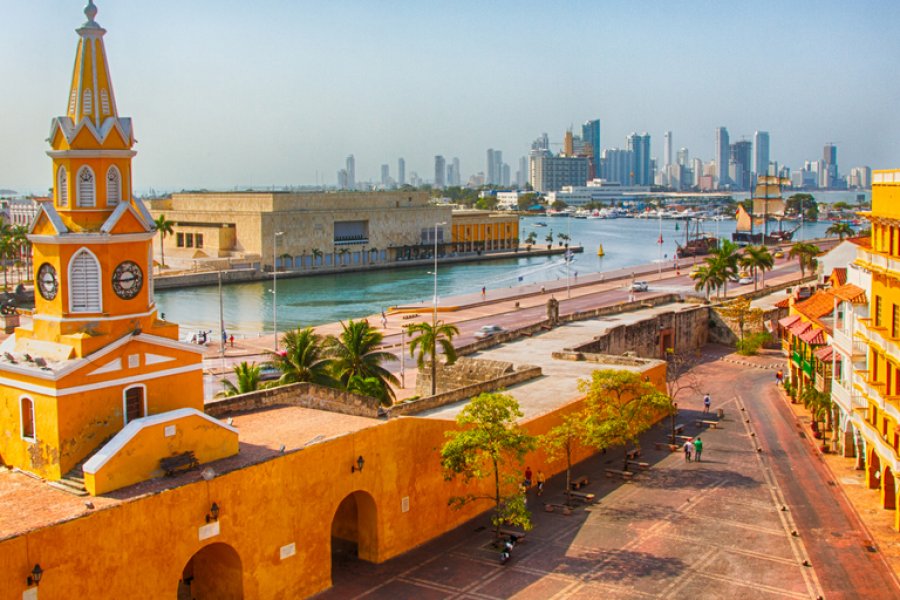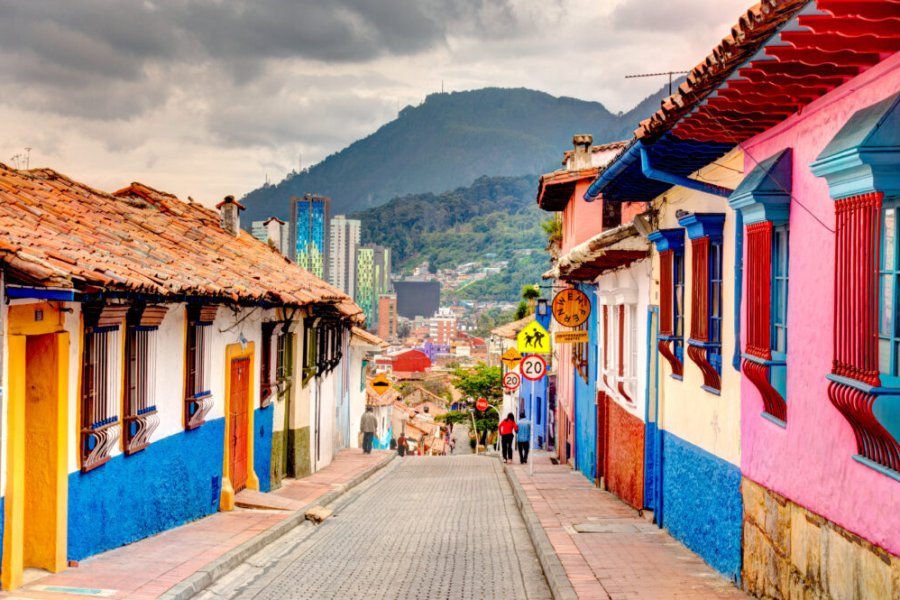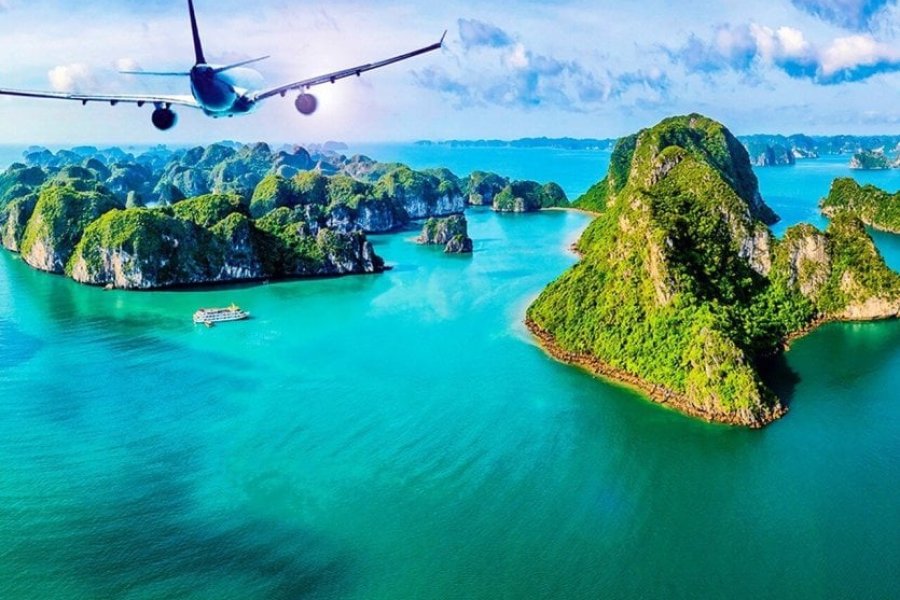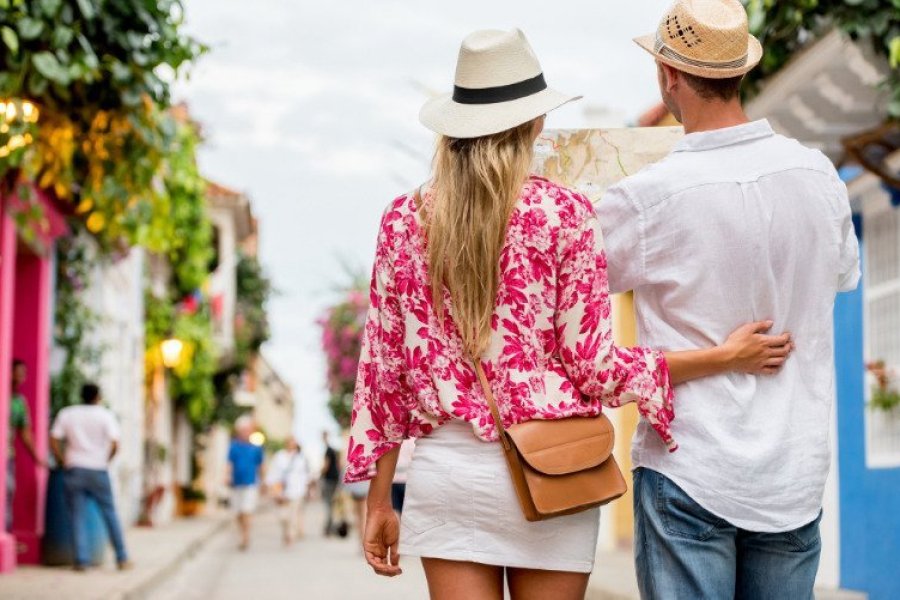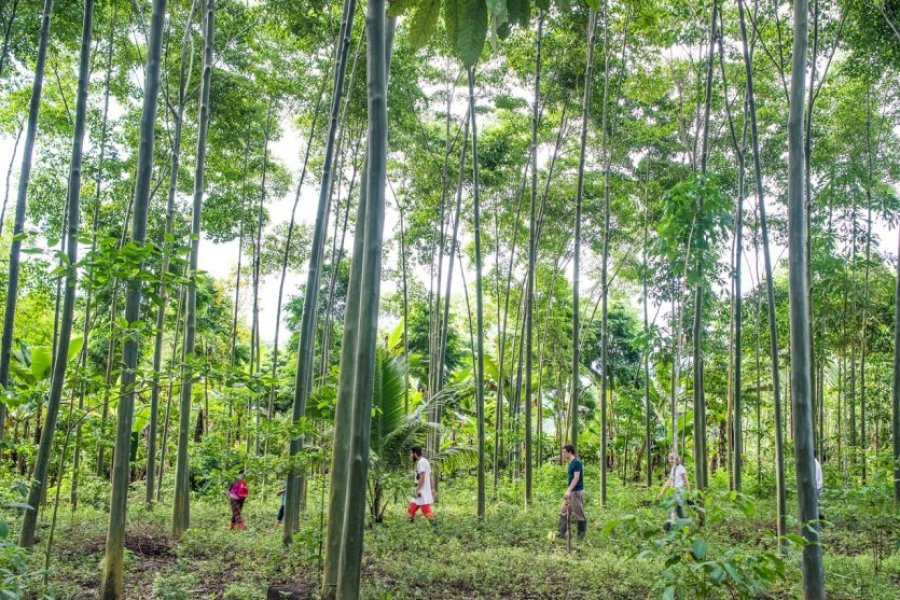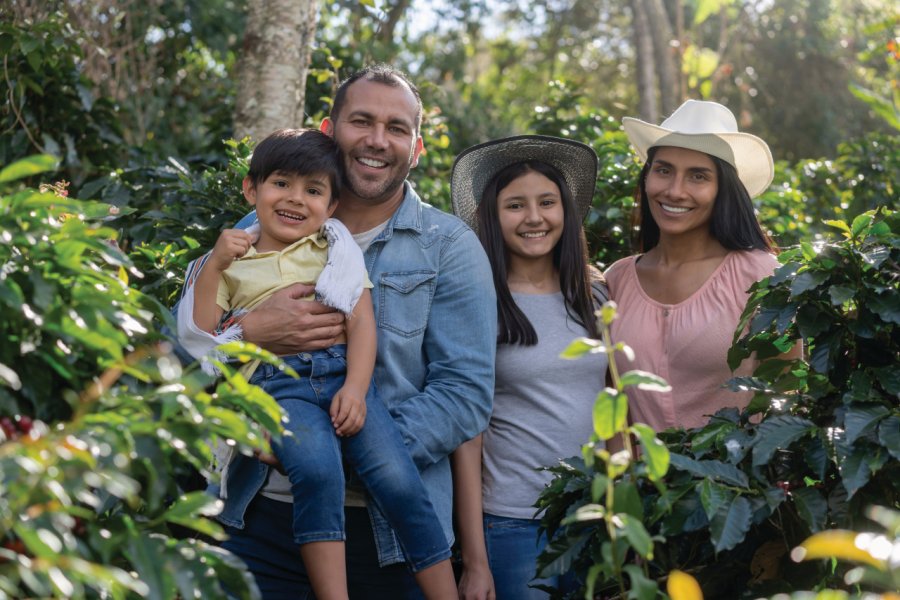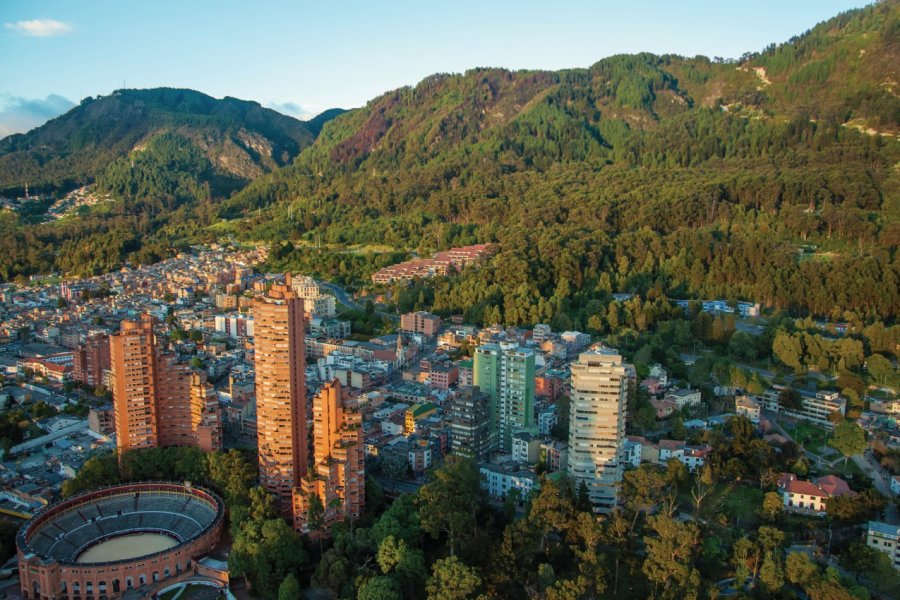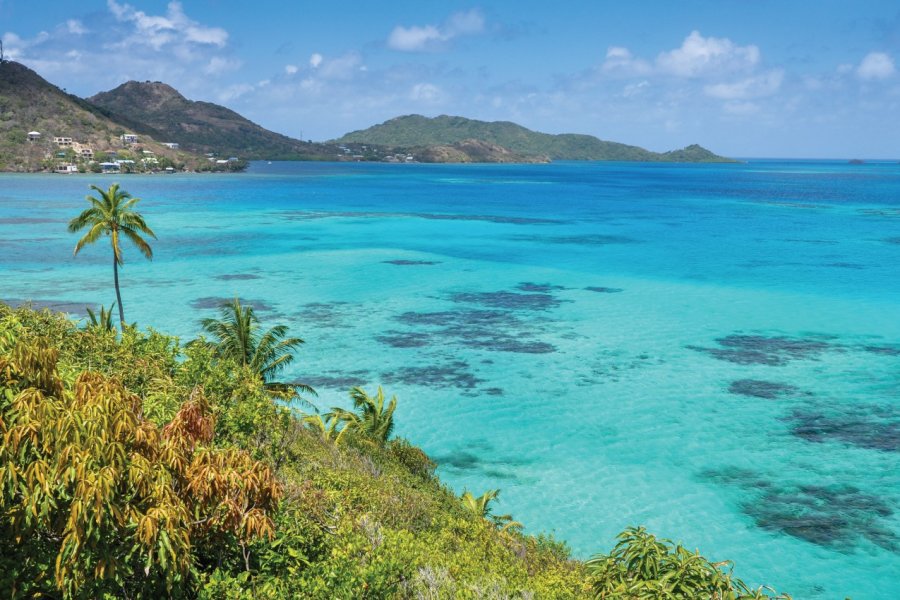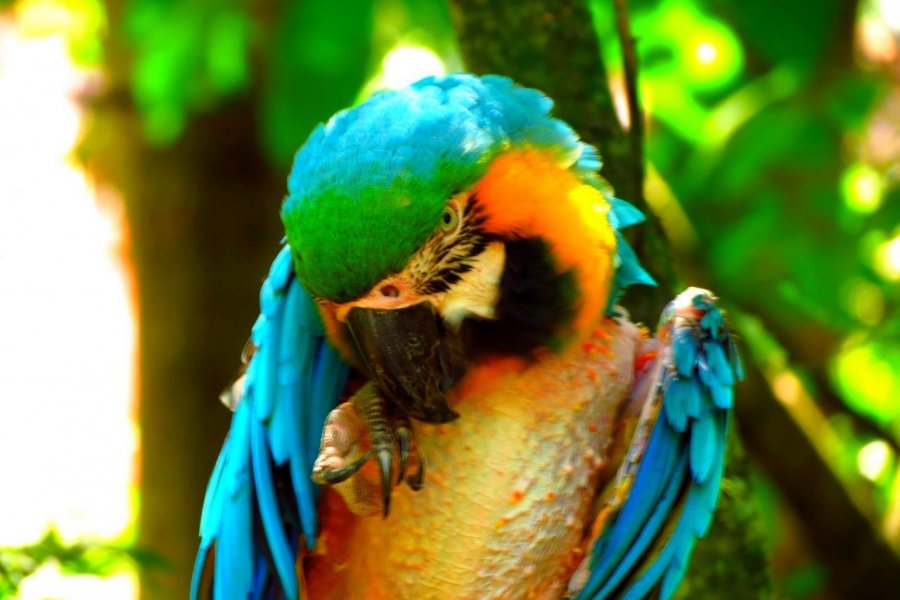Travel guide Colombia
Long neglected by world travelers because of the civil war that plagued the country for fifty years, Colombia has regained all its luster since the peace with FARC was ratified. It is now time to go on a trip to Colombia with a tour guide to discover a Latin American destination with multiple cultural and natural assets at the crossroads between South and Central America. From the snow-capped Andean peaks to the ochre sand beaches of the Pacific coast where travelers can observe whales, from the lush Amazon rainforest where some indigenous peoples still live out of time to the fabulous monolith of the Piedra del Peñol, from the colonial architecture of Cartagena de Indias or the villages of Villa de Leyva and Barichara to the pre-Columbian lost city (Ciudad perdida) built in the heart of the Sierra Nevada of Santa Marta, Colombia is a real treasure chest. Hikers will trek in the huge national parks of Tayrona, El Cocuy or Los Nevados. Adventurers will discover the exceptional fauna and flora of the Amazon or visit pre-Columbian archaeological sites. Thrill seekers will choose San Gil, the Colombian capital of extreme sports. Lovers of idleness will opt for the most beautiful beaches of the Caribbean coast of Colombia and the coral islands of the Rosario archipelago, while coffee lovers will quietly enjoy a cup of coffee under their sombrero in the numerous fincas (plantations) of the "Coffee Triangle", south of Medellin and towards Cali. Bogota, with its candelaria and its many museums, also has many assets and is an interesting stop during your trip to Colombia.
What to see, what to do Colombia?
-
Book an activity
-
Customized travel
- The most beautiful cities Colombia
When to go Colombia ?
The best time to go to Colombia is the dry season (December-March) even if the rainy season (April-May and October-November, depending on the region) is not to be avoided absolutely because it does not rain all day except in the Amazon and on the Pacific coast. Three periods correspond to the high tourist season(temporada alta): mid-December to mid-January (school vacations), Semana santa (Holy Week, mid-April) and to a lesser extent, from mid-June to the end of July (school vacations).
Suggested addresses Colombia
Travel Colombia
-
Find a hotel
-
Car Rental
-
-5% on travel insurance
-
Find a local agency
S’inventer un itinéraire en Colombie n’est pas chose aisée. Cela dépend surtout du temps dont on dispose, car les attractions sont nombreuses, et elles sont réparties dans les quatre coins du pays, avec des temps de trajets souvent rebutants par la route. Il faut donc identifier exactement ce que l’on veut faire et voir : plutôt des vacances farniente ou sportives ? Plutôt un trip aventure en pleine nature ? Plutôt des visites de villes coloniales et de sites archéologiques ? Où probablement un mélange de tout cela ! L’important est de se laisser un peu de marge entre les destinations et de ne pas vouloir en faire trop (vous pouvez revenir !). Les déplacements en avion permettent de gagner du temps pour les voyageurs pressés, et ce n’est souvent pas tellement plus cher que le bus. On peut aussi louer une voiture. L’idéal est de combiner les modes de transport et de garder de la place pour l’improvisation, disons-le, à la colombienne !
Find unique Stay Offers with our Partners
How to go Colombia
How to go alone
There are direct flights to Colombia, especially to the capital Bogota. Please note that the price variation depends on the airline used, but especially on the reservation delay. In order to get the best rates, it is essential to book well in advance. Think about buying your tickets a few months before your departure!
How to go on a tour
Colombia has many receptive agencies (tour operators present in the country) able to organize all or part of your stay (booking accommodation, domestic flights, guides...), or to plan and manage guided tours, activities and excursions on site. They have the best contacts throughout the country and the necessary insurance.
How to get around
If the bus is the most common way to travel around Colombia with a terminal in each city, the plane remains the safest way to move from one end to the other of the immense national territory when we look at the statistics of the mortality on the roads... The air links are numerous and frequent.
Featured articles Colombia
Discover Colombia
The country of El Dorado, of coffee, of flowers, of emeralds... What do we know about Colombia, this distant country located in the middle of a continent that we already don't know well? How many people think that in Bogotá it is warm all year round, or that Pablo was a kind of "Robin Hood"? The media and TV shows often present this tropical country as dangerous, tormented and sulphurous. There is some truth to this, but it is difficult to imagine the complexity of a nation that experiences the worst and the best at the same time, a country where the stories you are told are far beyond fiction. In the following pages, we will give you a glimpse of this fascinating country located on the borders of South America. Geographical, historical, or cultural keys, and some tracks on the stakes of society, to better understand Colombia and thus have the possibility of exchanging more deeply with its inhabitants.
Pictures and images Colombia
The 12 keywords Colombia
1. Biodiversity
Colombia is home to the greatest biodiversity in the world after Brazil, eight times larger. More than 10% of the world's fauna and flora in only 0.77% of the planet's surface. It is by far the first country in the world in number of species of birds, butterflies and orchids. A paradise for naturalists and biologists!
2. Coffee

Colombia is famous for its coffee, a characteristically sweet Arabica grown in the verdant mountains between 1,200 and 1,800 m above sea level. The best beans are exported, but in recent years it has become possible to drink good coffee in Colombia, thanks to the emergence of specialized establishments with talented baristas.
3. Chiva

A typical old bus, built from a bus chassis with a wooden frame, painted in bright colors (often in the colors of the national flag). A rural means of transportation, where men, chickens, pigs or coffee bags are piled up. In the city, the chivas that we see are usually real mobile discotheques!
4. Cocaine
Sadly, cocaine is a word that comes up all too often when Colombia is mentioned. It's hard to ignore the fact that the country is the world's leading producer, and that the white powder is at the heart of the Colombian conflict, financing criminal gangs, paramilitaries and guerrillas, not to mention the campaigns of certain political parties.
5. Cumbia
Cumbia is Colombia's most representative musical genre and dance. Born in the Caribbean region, it symbolizes crossbreeding and is the result of a delicious blend of drum rhythms inherited from African slaves, the sounds of indigenous flutes and the instruments and melodies brought by Spanish colonists. Hit the dance floor!
6. Echao pa' lante
The title of an album by the great salsero Joe Arroyo, but above all what characterizes the vast majority of Colombians: an enterprising and combative state of mind, one that forges ahead in any circumstance, that hangs on despite the difficulties of everyday life - in short, optimism and enthusiasm in every sense of the word.
7. El Dorado
The myth ofEl Dorado, the City of Gold, is said to have originated in Spanish chronicles recounting Muisca ceremonies, in which offerings of gold and precious stones were thrown from a raft into the waters of the Guatavita lagoon, to satisfy the gods. Bogotá's Gold Museum presents the Balsa Muisca, a gold reproduction of these events.
8. Esmeralda
Colombia is the world's leading emerald producer. The Chibchas mined emeralds long before the arrival of the Spanish. Today, they are used to make superb jewelry. Colombian green", with its dark, intense tones, is the benchmark. The value of the stone depends on its color, clarity, shape and weight.
9. Frutas

Colombia is the country of fruit juices, which are served from breakfast to dinner. The enormous variety of fruits with strange names is a surprise for the eyes as well as for the taste buds. Lulo, guanabana, uchuva, feijoa, or tomato de arból, untraceable in our country, rub shoulders with maracuya, mango, guava... To consume without moderation!
10. Páramo
This neo-tropical biotope found in the Andean highlands, at more than 3,200 meters above sea level, has the particularity of presenting a strong endemism and storing a large part of the water resources that feed the rivers of the country. Colombia has the largest and richest páramos in the world. To discover!
11. Paz
The Colombian people have been longing for peace for decades. The 2016 agreements between FARC and the Colombian government have (deliberately) not been implemented as they should have been. The battle for peace is a road strewn with pitfalls, and involves reducing poverty and inequality, education and reconciliation.
12. Willys

This American war jeep, capable of withstanding the most difficult climatic and topographical conditions, arrived in Colombia in the 1950s-60s, to transport sacks of coffee and farmers. Unbreakable and repainted in bright colors, it has stood the test of time and is an integral part of the landscape and coffee culture.
You are from here, if...
You don'tjust say "Hi, how are you?", your greetings are always multiple: ¿ Qué has hecho?, ¿ Q'hubo?, ¿ Qué más?, ¿ Cómo te ha ido?, ¿ Como andas?
You laugh yellow at jokes associating Colombia with cocaine or Pablo.
You're set onthe hora colombiana and no longer apologize when you arrive late. You can even forget to arrive...
As aman, you know how to be gallant; in restaurants, you never offer to split the bill. As a woman, you get used to people being attentive to you.
You've learned all the tricks to avoid dar papaya. You think that if someone has been robbed or ripped off, it must be their fault!
You know the difference between a tinto and a café.
You close all cab doors.
On December 31st, just before midnight, you take a suitcase around the block to guarantee a year full of travel and adventure!

